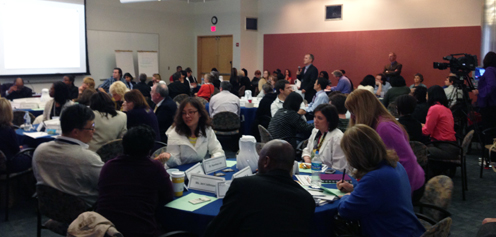
What are tabletop and operational exercises?
Tabletop and operational exercises, within the NIH Continuity of Operations (COOP) environment, are utilized to provide emergency response and recovery staff members with the opportunity to work together in a controlled environment. This allows staff to operate under a realistic scenario, with critical impacts that require immediate assessment, followed by evaluating available assets in order to establish appropriate strategies to protect personnel and maintain the NIH mission.
What is the difference between a tabletop exercise and operational exercise?
Tabletop exercises are based on collaboration, involves a group of people from a specific Team i.e. the COOP Team, an ICs Crisis Response Team, Fire and/or Police Departments, a Leadership Group, or all of the above combined into a room and around a table. The purpose is to present a scenario with significant impact as to affect and endanger the NIH mission. Once this is presented the members of the exercise group collectively discuss the individual impacts and develop a course of action. The goal is to acquaint staff with their teams processed and procedures, identify gaps and establish action items to improve response to future incidents
Operational exercises involve the same staff and the objectives and goals are the same with one exception. An operational exercise is conducted to allow staff to work in an environment that simulates an actual incident. Staff will work from areas designated by their team leads; communicate as they would in an emergency i.e. via phone, text, email or being notified to meet either face to face or via conference call.
Why conduct an exercise?
One of the big advantages of exercises is that it allows staff to identify and test hypothetical situations without causing disruption to the daily mission, for example: if an organization wants to know how they will react to a flood in their facility, electrical outage, loss of IT systems, major weather event, etc. The NIH COOP will utilize a tabletop or operational exercise to test established plans focused on managing critical infrastructure processes impacted by a major electrical outage across the Region without having to actually shut down these systems.
Who are tabletop exercises intended for?
Exercises are designed for emergency responders, COOP Teams, recovery staff, Institute and Center Crisis Response Teams, Divisions and Offices preparing to continue their mission following a major impact or emergency.
How are exercises conducted?
The Division of Emergency Preparedness and Coordination (DEPC) has conducted well over 100 tabletop exercises since the practice began in 2005. Tabletops are collectively developed by the DEPC and the group requesting the training. The DEPC meets with the requesting lead of the group and determines the purpose and intended objectives. Once this is accomplished the DEPC develops the initial draft of the scenario along with the injects and meets with the group lead for review. Upon completion of the review the scenario and injects are finalized and DEPC staff facilitates the actual exercise.
How are lessons learned captured during an exercise?
The DEPC chronicles the discussion during the event and hotwash and then develops an After Action Report. The After Action Report is an overview of the exercise and identifies gaps, or area for examination, which may enhance the recovery of the organization following an impact.
How to request an exercise be conducted
If you would like more information on Tabletop or Operational Exercises contact the Division of Emergency Preparedness and Coordination at 301-496-1985.